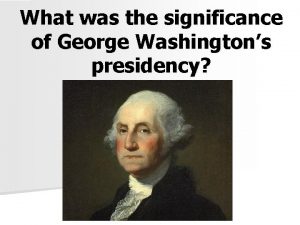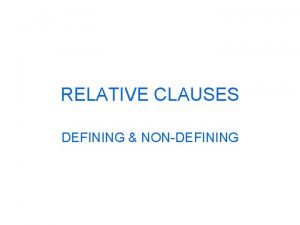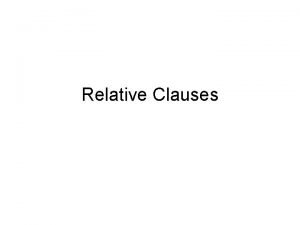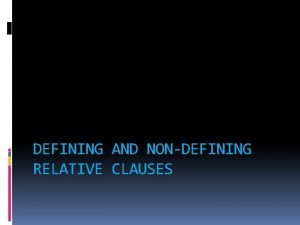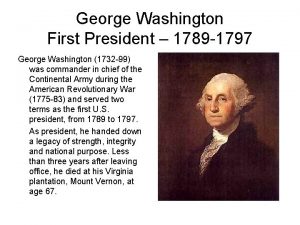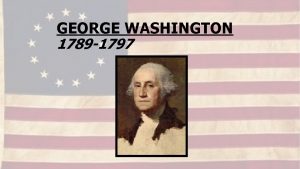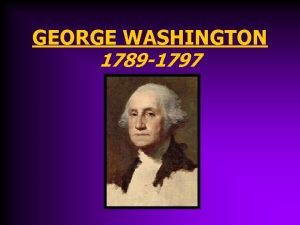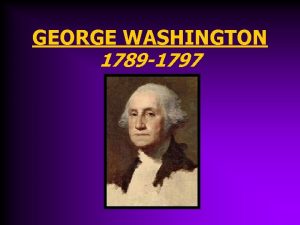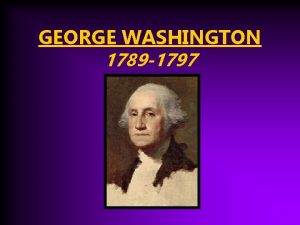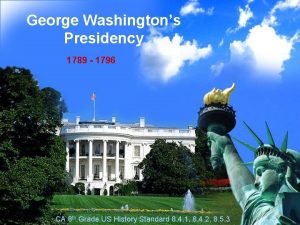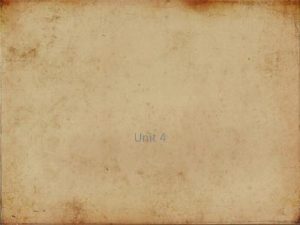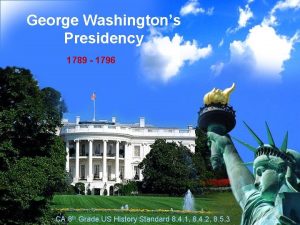Washingtons Presidency Defining the Presidency April 30 1789








- Slides: 8

Washington’s Presidency

Defining the Presidency • April 30, 1789 - Washington is inaugurated • Very humble man, did not consider himself worthy of his position • Constitution provided a rough framework of Presidential powers, but no one was sure what the day-to-day duties of the President would be • George Washington- strong, active rolemuch like his role as a general

The First Cabinet • The Cabinet- a group of advisors who head the executive departments • Originally only 3 Cabinet departments (today 15) • Department of State- John Jay (Replaced by Thomas Jefferson in 1790) • Department of Treasury- Alexander Hamilton • Department of War- Henry Knox

Finances • US Government maintained a large debt from the American Revolution ($54 million with interest), along with assuming the debts of the states($25 million with interest) • Hamilton’s ideas • We needed to pay off ALL our debts to show the world our stability and independence- this would encourage foreign investors • National Bank- collect taxes, make loans, hold government funds • Protective tariffs- encourage American industry- break dependence on England

Finances • Opposition to Hamilton • Some southern states had already paid off their debts- didn’t want to pay taxes for other state debt • Thomas Jefferson and James Madison thought the national bank was unconstitutional- didn’t think the government was given the right to create it • Thomas Jefferson feared supporting industry would damage farmers • Hamilton lost popularity- Jefferson painted him as a monarchist and elitist

Year of Crisis • French Revolution- began in 1789, in 1793 King Louis XVI and Marie Antoinette executed • French attempt to enlist American help in their Revolution • America desperately wanted to remain neutral- despite their treaty with France • Couldn’t afford a military entanglement with England • Refusal to support France caused great division within American people • John Jay sent to England- negotiated a treaty in attempts to remove English troops from the frontier • Seen as taking sides with the English over France- upset Jefferson • Mass protests • Washington reluctantly signs treaty to keep America out of war

The Whiskey Rebellion • To pay debts, Congress passed a tax on whiskey- which is made from wheat- easiest way for farmers to make money from wheat was to make liquor • 1794 - 7, 000 Pennsylvania farmers marched on Pittsburgh` in protest- Washington led 15, 000 militia men against them • Washington wanted to show that the government would enforce Congress’ actions • Thomas Jefferson- upset at the government ignoring and supressing the desires of the people • Afterwards, Washington was eager to retire to Mount Vernon in 1796

Evaluation- Mini Essay • What do you think of George Washington as a President? • Take a look back through your notes of the things that happened during his time in office, the choices he made, who he agreed with, etc. • What did you like/dislike? (Hamilton’s plan, his response to the Whiskey Rebellion, treatment of France, etc. ) • How do you think a President is supposed to make these tough decisions? • How do you think Washington’s choices impacted the future of the Presidency? • Write your answers into a mini-essay (at least 3 paragraphs- intro, discussion of Washington, discussion of the presidency/conclusion) that will be due at the start of class tomorrow

